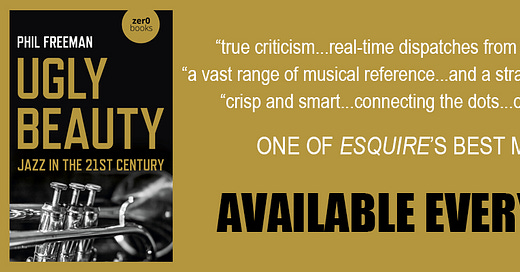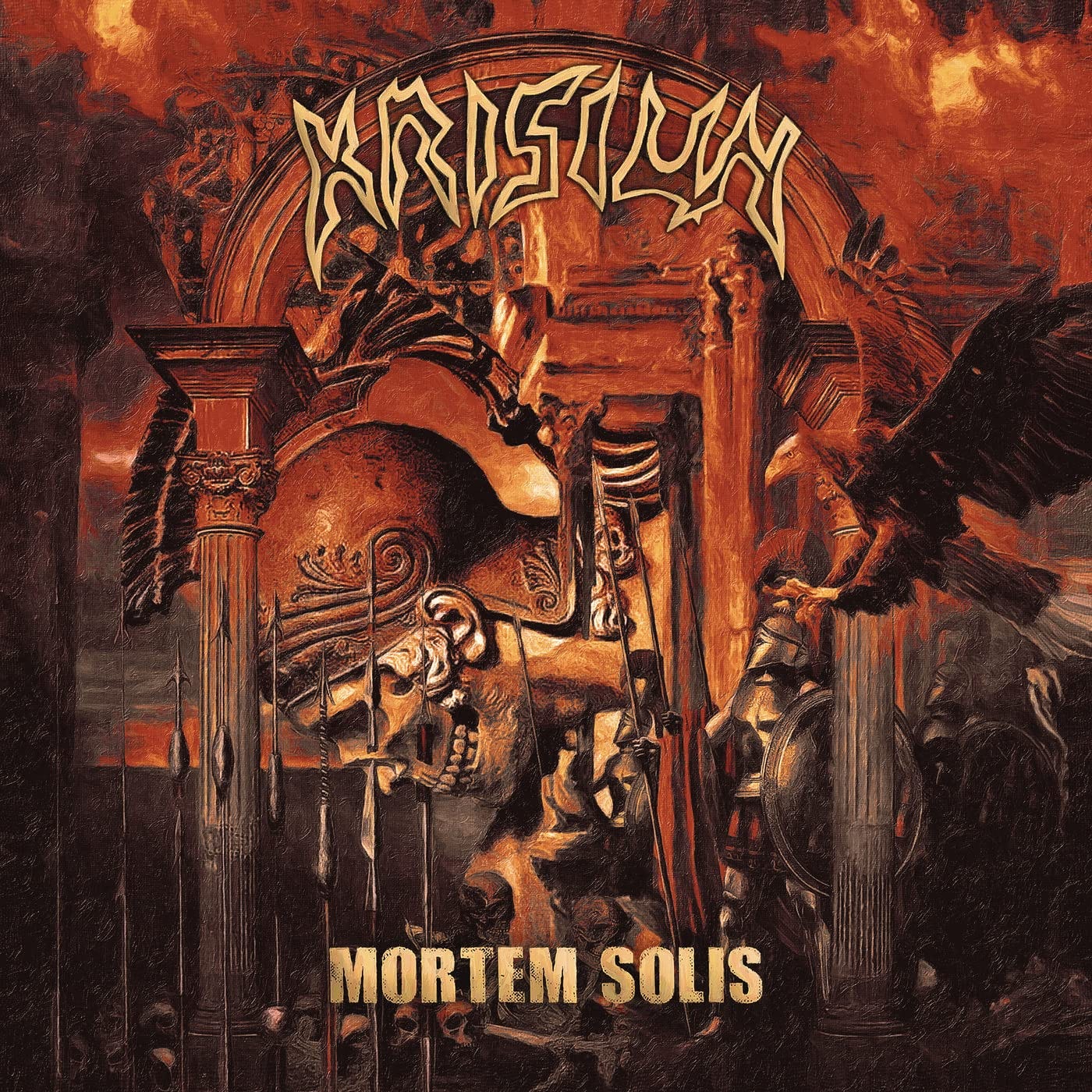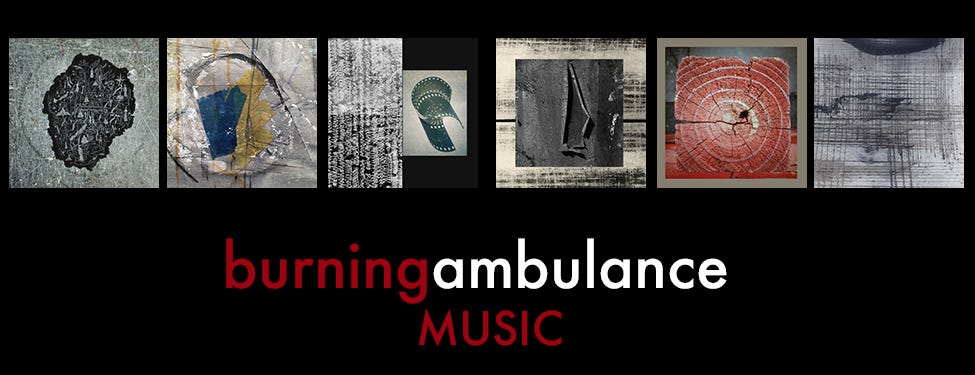My latest book, Ugly Beauty: Jazz in the 21st Century, is six months old this week; it was published by Zero Books on January 28 in the UK and February 1 in the US.
I spent most of 2020 writing it, and that turned out to be the perfect time to write a book about a constantly progressing, incessantly changing art form. (Can you guess why?) When I started, I considered making its first sentence “This book is out of date,” but the pandemic helped keep that from being the case, at least to the degree it might have been otherwise. Anyway, I’m really proud of it, and I’ve been incredibly gratified by the reception it’s received so far.
It was reviewed very favorably by DownBeat, JazzTimes, LondonJazzNews, the Free Jazz Blog, We Jazz magazine, bebop spoken here, and AllAboutJazz, and Esquire named it one of the Best Music Books of 2022. I was interviewed for DownBeat and Jazziz, and by Portuguese journalist Rui Miguel Abreu for his site Rimas e Batidas (that one’s in Portuguese).
I also gave a long interview to AllAboutJazz, which was published last week. I met the interviewer, Tyran Grillo, on a trip to Norway a couple of years ago; he’s a really nice, really smart guy. (He runs the site ECM Reviews, on which he reviews everything the venerable German label puts out.) We talked about a vast range of subjects, with the book as a springboard that led us to Cecil Taylor, Keiji Haino, production trends in death metal, Duke Ellington, and much more. Read it.
(There’s an excerpt from Ugly Beauty at AllAboutJazz, too. It’s the book’s first chapter, a profile of saxophonist JD Allen. Here’s the link.)
If you already own a copy, thank you. I mean that. I’m incredibly grateful that anyone reads my stuff at all, and/but I really do think it’s my best book (yet). If you don’t already own one, I hope some part of that barrage of praise has convinced you that you need a copy of Ugly Beauty: Jazz in the 21st Century in your life. It’s available all over the place, but here are three quick ’n’ easy ways to get one: Amazon, Barnes & Noble, Bookshop.
The new Perfume album, PLASMA, came out last week, and I’ve been listening to it a lot. I’ve been a fan for more than a decade at this point; seeing them live at Hammerstein Ballroom in 2014 was one of the most fun concert experiences of my life. Their last two albums — 2016’s Cosmic Explorer and 2018’s Future Pop — were just OK, though. So I kind of expected more of the same this time: cybernetic pop tunes produced as always by Yasutaka Nakata, with the three women’s voices blended into a pleasant, slightly uncanny valley-ish ensemble sound, chirpy at times and vaguely melancholy at other times.
And yeah, vocally, A-Chan, Nocchi and Kashiyuka sound much like they always have. But Nakata has delivered some of the best music of his career on this album. It begins, as Perfume albums often do, with a short intro. This one is also the title track, and it has an almost Perturbator-esque feel, with drums that punch hard and synths that wheel in the sky like cybernetic vultures. You would be forgiven for thinking they were about to make a turn toward industrial, or at least EDM. But the first actual song, “Time Warp,” is ultra-chirpy electro J-pop of a type they’ve done many times before, one of several moments that made me say to myself, Yes, this is what a Perfume song sounds like.
There’s another left turn coming fast, though. “Polygon Wave,” a pre-album single, sounds like Daft Punk-esque filter disco. More accurately, it sounds like “Music Sounds Better With You,” the one-off 1998 single by Thomas Bangalter’s side project Stardust. “Spinning World” is another highlight, a cool track set to a hip-hop/funk rhythm. This recent TV performance showcases the impeccable, posthuman choreography that’s been a Perfume trademark forever:
The most striking track on Plasma, though, is “Drive’n the Rain.” At 6:17, it’s one of their longest songs (only the stomping techno anthems “Party Maker” from Level3 and “Edge” from Triangle, at 7:22 and 8:43(!) respectively, are longer), but what really sets it apart is its mood. It’s not a dancefloor banger; it’s an uptempo but still internally chilled-out mood piece that begins with the sound of rain and is constructed to sound like silky jazz-funk or ’80s “city pop.” It’s so slick and smooth, with what sounds like live funk bass and some ultra-AC keyboard soloing in the second half, that I wouldn’t have been at all surprised to hear Michael McDonald crooning on the choruses. I’ll come right out and say it: Plasma is the best Perfume album in a decade, and maybe their best album-as-album ever. Their records are usually somewhat bafflingly sequenced, full of jarring transitions; this one works from beginning to end. There’s not a bad track here. Give it a chance.
Another trio, Brazil’s Krisiun, also returned with their first album in four years this week. And if you’re a fan of face-punching death metal, Mortem Solis, the follow-up to 2018’s Scourge of the Enthroned, might be exactly what you need.
Krisiun are a family band. Guitarist Moyses Kolesne, drummer Max Kolesne, and bassist/vocalist Alex Camargo are all brothers, but Alex uses their father’s last name while the other two use Mom’s.
Krisiun are all about efficiency. They are a riff delivery system without peer. Their music is highly percussive, but I don’t mean that in a complex-polyrhythms sort of way at all. What I mean is that every single element of their songs — guitar, bass, drums, even vocals — hits like a drum. They chug, they punch, they pile-drive. Their riffs sound like a heavyweight boxer working the heavy bag. There are almost no solos to speak of. Even when Moyses allows himself a little flourish, it’s just a slightly different riff, pitched an octave higher, like he’s decided to stab you in the face instead of the chest, this one time. Alex doesn’t sing; he bellows the lyrics at you in a voice that’s like a cross between Max Cavalera and a drill instructor. He always sounds like you’ve disappointed him in some way. Max Kolesne pounds the drums. Every hit sounds like it’s delivered with both hands, starting from over his head. (And yet, watch that video above — he’s actually got a remarkably light, almost jazzy touch!)
Krisiun have been around for over 30 years; they formed in 1990, and released their first album in 1995. Mortem Solis is their 12th. They know exactly what they’re doing, and are already bringing enough people into the tent that they don’t need to cater to anyone seeking novelty. Once upon a time, Robert Christgau said (in a Motörhead review), “I admire metal’s integrity, brutality, and obsessiveness, but I can’t stand its delusions of grandeur,” to which Joe Carducci replied (in Rock and the Pop Narcotic) that any music that had integrity, brutality and obsessiveness was under no delusions of any kind. I’m with Il Ducci on this one, and Krisiun have all three metallic virtues going for ’em. The song titles alone reveal a remarkable clarity of vision; they even pair up: “Sworn Enemies”/“Swords Into Flesh”; “Tomb of the Nameless”/“Temple of the Abattoir”; “Dawn Sun Carnage”/“War Blood Hammer”; and my favorites, “Serpent Messiah”/“Worm God.”
Death metal is a really varied art form. You can find almost anything under the umbrella, from stuff that’s practically jazz fusion (Obscura) to fist-pumping, beer-hoisting shoutalongs (Amon Amarth, who have a new album out this Friday). Krisiun have been a three-pronged jackhammer since Day One, and they’re never gonna change. Mortem Solis is a great album for those days when you want to roar like a grizzly.
The two latest releases from Burning Ambulance Music, Breath Of Air’s self-titled album and José Lencastre’s Inner Voices, are out now. They’re already starting to get some really nice reviews from Peter Margasak at The Quietus (here) and Mike Borella at Avant Music News (here). Do yourself, the artists, and me a favor and head to the BA Music Bandcamp page and buy one or more of these fine records.
That’s it for now. See you in a week!







